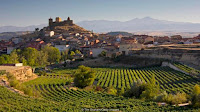 |
| Coming to the US next year |
In "The world's first blue wine", Julie Bensman writes that a wine two years in the making is causing controversy in traditional Spanish wine culture (2016). According to Bensman, Gïk was created to "start a little revolution," which is reflected in its associations with alternative bands and other non-traditional elements of culture. Although available in 25 countries, Bensman notes that it is uncertain whether the electric blue wine will prove more than a passing fad.
_______________________________________
My response
When I saw the headline on the BBC's homepage as I was having my morning coffee on Saturday, my first reaction was "Eugh!" But I also had to finish my morning drug hit and rush off to teach my 8:00 AM writing class, so only skimmed the story quickly before emailing it to myself. It seemed like the sort of story that might not "prove more than a passing fad."
Reading it again later, and rereading it a couple of times this morning, my initial reaction was confirmed: eugh! Although wholesomely natural (Is nature wholesome? Really?), Gïk is also described as being a "sweet, slightly syrupy mouthfeel" and that's enough to turn me off (mouthfeel? I only just noticed that weirdness, which my brain had automatically read differently, when I copied and pasted it in here. I presume Bensman means mouthful). Alcohol in its many varieties, from beer to whisky to rum to wine to cognac and so on is the popular drug of addiction in most cultures, and always has been, but I prefer mine red, not sweet, and preferably in the company of some good food and familiar companions.
 |
| Spain's northern Basque Country |
On the other hand, I am a great admirer of classical literature and the cultures of Greece and Rome, whose ideas and inventions largely found today's global culture, including Thailand's. I don't know what percentage of people today have read Homer, for example, but already in The Iliad we see the ideas of democracy and critical thinking that contrast so strongly with the authoritarian cultural norms of the neighbouring East, and which would knock the gods and other despots off their thrones to give rise to what we have inherited, albeit with the Middle Eastern invasion of Christianity that temporarily conquered the Western world from 400 AD. But we can drink, not with Gïk, to the happy recovery these days of the West from that long-invading superstition.
A totally unrelated other thought: I was also reminded of the fad for blue lipstick. This was popular with some of my trendy young friends when I was at university some decades ago; I saw a couple of articles on it recently, so perhaps it's enjoying a return to faddishness, like the Rubik's Cube, which was also all the rage for a few months when I was at university. Blue lipstick in a dim, sparse nightclub playing industrial music seems just the place for blue wine, except perhaps for that annoying sweetness. Eugh! The final mouthful of fresh morning coffee should wash that away.
_______________________________________
Reference
- Bensman, J. (2016, November 19). The world's first blue wine. BBC Travel. Retrieved from http://www.bbc.com/travel/story/20161104-the-worlds-first-blue-wine
Note: it's published in BBC Travel, not inBBC News.
This comment has been removed by the author.
ReplyDeleteThis comment has been removed by the author.
ReplyDeleteThat sounds interesting, in order to increase product values ,Many people offer new products for costumers. They improve that for unique. When costumers know blue wine ,they will want to try it.
ReplyDeletePersonally, I do not like wine but it makes me feel excited and I want to try it. I think it is one of their purpose because they can entice costumers who do not like traditional products to interest their product. Most importantly, blue wine should be delicious in order to keep their customers. Nevertheless, If blue wine not tasty, costumers will do not drink it again.